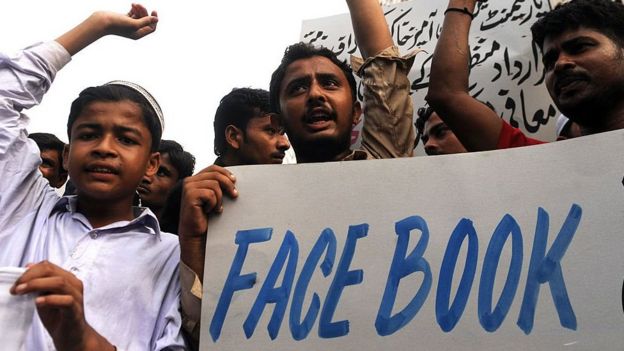A man accused of posting blasphemous content to Facebook has been sentenced to death by a court in Pakistan.
Taimoor Raza was convicted after allegedly posting remarks about the Prophet Muhammad, his wives and companions within the site’s comments.
The public prosecutor involved said he believed it was the first time the death penalty had been awarded in a case related to social media.
Human rights campaigners have expressed concern.
Facebook itself has yet to comment on the case.
The US firm previously announced in March that it was deploying a team to Pakistan to address the government’s concerns about blasphemous content on its service, but added that it still wished to protect “the privacy and rights” of its members.
Pakistan’s Prime Minister Nawaz Sharif has described blasphemy as being an “unpardonable offence”.
Religious debate
Raza’s case was heard by an anti-terrorism court in Bahawalpur – about 309 miles (498km) from the capital Islamabad.
His defence lawyer said the 30-year-old had become involved in an argument about Islam on the social network with someone who had turned out to be a counter-terrorism official.
The public prosecutor said the accused had been arrested after playing hate speech and blasphemous material from his phone at a bus stop, following which his handset had been confiscated and analysed.
Raza will be able to appeal against the death penalty at Lahore High Court and then, if required, in Pakistan’s Supreme Court.
The Express Tribune, a local newspaper, reported that the verdict came days after a college professor was refused bail in another case involving accusations of blasphemy on social media in Pakistan.
Amnesty International recently published a report critical of the country’s blasphemy laws.
Its Pakistan campaigner, Nadia Rahman, has called for Raza’s immediate release.
“Convicting and sentencing someone to death for allegedly posting blasphemous material online is a violation of international human rights law and sets a dangerous precedent,” she told the BBC.
“No one should be hauled before an anti-terrorism court or any other court solely for peacefully exercising their rights to freedom of expression and freedom of thought, conscience, religion or belief online.”

Photo: There were anti-Facebook protests in 2010 after a competition to draw the Prophet Muhammad | GETTY IMAGES
The developments come seven years after a Pakistan court temporarily blocked local access to Facebook after the social network was used to promote a contest to draw images of Prophet Muhammad – an act considered to be offensive by many Muslims.
Analysis – Tahir Imran, BBC Urdu social media editor
This is a dramatic time for Pakistani social media. Once considered a platform where people could express themselves freely, it is now a place where people worry about the consequences of commenting.
Instead of acting to restore confidence and safeguarding the masses’ right to freedom of expression, the government has been busy making threats through TV and newspaper adverts.
This is happening with a clear understanding about the gravity that accusations of blasphemy can have. There have been several incidents of vigilantes taking the law into their own hands after such claims.
Human rights activists accuse the government of pushing through a controversial cyber-crimes law without addressing their concerns.
In a country where fewer people have been convicted of blasphemy than have been killed after being accused of the offence, this ruling will not calm nerves. And increasingly people prefer to use chat apps and closed groups to post content so that their thoughts cannot be seen by the wider public.
